|
7:31 P.M. EDT
THE PRESIDENT:
THE PRESIDENT: Tonight, I’d like to update the American people on the
international effort that we have led in Libya –- what we’ve done, what we plan
to do, and why this matters to us.
I want to begin by paying tribute to our men and women in uniform who, once
again, have acted with courage, professionalism and patriotism. They have moved
with incredible speed and strength. Because of them and our dedicated
diplomats, a coalition has been forged and countless lives have been saved.
Meanwhile, as we speak, our troops are supporting our ally Japan, leaving
Iraq to its people, stopping the Taliban’s momentum in Afghanistan, and going
after al Qaeda all across the globe. As Commander-in-Chief, I’m grateful to our
soldiers, sailors, airmen, Marines, Coast Guardsmen, and to their families. And
I know all Americans share in that sentiment.
For generations, the United States of America has played a unique role as an
anchor of global security and as an advocate for human freedom. Mindful of the
risks and costs of military action, we are naturally reluctant to use force to
solve the world’s many challenges. But when our interests and values are at
stake, we have a responsibility to act. That’s what happened in Libya over the
course of these last six weeks.
Libya sits directly between Tunisia and Egypt -– two nations that inspired
the world when their people rose up to take control of their own destiny. For
more than four decades, the Libyan people have been ruled by a tyrant -– Muammar
Qaddafi. He has denied his people freedom, exploited their wealth, murdered
opponents at home and abroad, and terrorized innocent people around the world –-
including Americans who were killed by Libyan agents.
Last month, Qaddafi’s grip of fear appeared to give way to the promise of
freedom. In cities and towns across the country, Libyans took to the streets to
claim their basic human rights. As one Libyan said, “For the first time we
finally have hope that our nightmare of 40 years will soon be over.”
Faced with this opposition, Qaddafi began attacking his people. As
President, my immediate concern was the safety of our citizens, so we evacuated
our embassy and all Americans who sought our assistance. Then we took a series
of swift steps in a matter of days to answer Qaddafi’s aggression. We froze
more than $33 billion of Qaddafi’s regime’s assets. Joining with other nations
at the United Nations Security Council, we broadened our sanctions, imposed an
arms embargo, and enabled Qaddafi and those around him to be held accountable
for their crimes. I made it clear that Qaddafi had lost the confidence of his
people and the legitimacy to lead, and I said that he needed to step down from
power.
In the face of the world’s condemnation, Qaddafi chose to escalate his
attacks, launching a military campaign against the Libyan people. Innocent
people were targeted for killing. Hospitals and ambulances were attacked.
Journalists were arrested, sexually assaulted, and killed. Supplies of food and
fuel were choked off. Water for hundreds of thousands of people in Misurata was
shut off. Cities and towns were shelled, mosques were destroyed, and apartment
buildings reduced to rubble. Military jets and helicopter gunships were
unleashed upon people who had no means to defend themselves against assaults
from the air.
Confronted by this brutal repression and a looming humanitarian crisis, I
ordered warships into the Mediterranean. European allies declared their
willingness to commit resources to stop the killing. The Libyan opposition and
the Arab League appealed to the world to save lives in Libya. And so at my
direction, America led an effort with our allies at the United Nations Security
Council to pass a historic resolution that authorized a no-fly zone to stop the
regime’s attacks from the air, and further authorized all necessary measures to
protect the Libyan people.
Ten days ago, having tried to end the violence without using force, the
international community offered Qaddafi a final chance to stop his campaign of
killing, or face the consequences. Rather than stand down, his forces continued
their advance, bearing down on the city of Benghazi, home to nearly 700,000 men,
women and children who sought their freedom from fear.
At this point, the United States and the world faced a choice. Qaddafi
declared he would show “no mercy” to his own people. He compared them to rats,
and threatened to go door to door to inflict punishment. In the past, we have
seen him hang civilians in the streets, and kill over a thousand people in a
single day. Now we saw regime forces on the outskirts of the city. We knew
that if we wanted -- if we waited one more day, Benghazi, a city nearly the size
of Charlotte, could suffer a massacre that would have reverberated across the
region and stained the conscience of the world.
It was not in our national interest to let that happen. I refused to let
that happen. And so nine days ago, after consulting the bipartisan leadership
of Congress, I authorized military action to stop the killing and enforce U.N.
Security Council Resolution 1973.
We struck regime forces approaching Benghazi to save that city and the people
within it. We hit Qaddafi’s troops in neighboring Ajdabiya, allowing the
opposition to drive them out. We hit Qaddafi’s air defenses, which paved the way
for a no-fly zone. We targeted tanks and military assets that had been choking
off towns and cities, and we cut off much of their source of supply. And
tonight, I can report that we have stopped Qaddafi’s deadly advance.
In this effort, the United States has not acted alone. Instead, we have been
joined by a strong and growing coalition. This includes our closest allies -–
nations like the United Kingdom, France, Canada, Denmark, Norway, Italy, Spain,
Greece, and Turkey –- all of whom have fought by our sides for decades. And it
includes Arab partners like Qatar and the United Arab Emirates, who have chosen
to meet their responsibilities to defend the Libyan people.
To summarize, then: In just one month, the United States has worked with our
international partners to mobilize a broad coalition, secure an international
mandate to protect civilians, stop an advancing army, prevent a massacre, and
establish a no-fly zone with our allies and partners. To lend some perspective
on how rapidly this military and diplomatic response came together, when people
were being brutalized in Bosnia in the 1990s, it took the international
community more than a year to intervene with air power to protect civilians. It
took us 31 days.
Moreover, we’ve accomplished these objectives consistent with the pledge that
I made to the American people at the outset of our military operations. I said
that America’s role would be limited; that we would not put ground troops into
Libya; that we would focus our unique capabilities on the front end of the
operation and that we would transfer responsibility to our allies and partners.
Tonight, we are fulfilling that pledge.
Our most effective alliance, NATO, has taken command of the enforcement of
the arms embargo and the no-fly zone. Last night, NATO decided to take on the
additional responsibility of protecting Libyan civilians. This transfer from
the United States to NATO will take place on Wednesday. Going forward, the lead
in enforcing the no-fly zone and protecting civilians on the ground will
transition to our allies and partners, and I am fully confident that our
coalition will keep the pressure on Qaddafi’s remaining forces.
In that effort, the United States will play a supporting role -- including
intelligence, logistical support, search and rescue assistance, and capabilities
to jam regime communications. Because of this transition to a broader,
NATO-based coalition, the risk and cost of this operation -- to our military and
to American taxpayers -- will be reduced significantly.
So for those who doubted our capacity to carry out this operation, I want to
be clear: The United States of America has done what we said we would do.
That’s not to say that our work is complete. In addition to our NATO
responsibilities, we will work with the international community to provide
assistance to the people of Libya, who need food for the hungry and medical care
for the wounded. We will safeguard the more than $33 billion that was frozen
from the Qaddafi regime so that it’s available to rebuild Libya. After all, the
money doesn’t belong to Qaddafi or to us -- it belongs to the Libyan people.
And we’ll make sure they receive it.
Tomorrow, Secretary Clinton will go to London, where she will meet with the
Libyan opposition and consult with more than 30 nations. These discussions will
focus on what kind of political effort is necessary to pressure Qaddafi, while
also supporting a transition to the future that the Libyan people deserve --
because while our military mission is narrowly focused on saving lives, we
continue to pursue the broader goal of a Libya that belongs not to a dictator,
but to its people.
Now, despite the success of our efforts over the past week, I know that some
Americans continue to have questions about our efforts in Libya. Qaddafi has
not yet stepped down from power, and until he does, Libya will remain
dangerous. Moreover, even after Qaddafi does leave power, 40 years of tyranny
has left Libya fractured and without strong civil institutions. The transition
to a legitimate government that is responsive to the Libyan people will be a
difficult task. And while the United States will do our part to help, it will
be a task for the international community and –- more importantly –- a task for
the Libyan people themselves.
In fact, much of the debate in Washington has put forward a false choice when
it comes to Libya. On the one hand, some question why America should intervene
at all -– even in limited ways –- in this distant land. They argue that there
are many places in the world where innocent civilians face brutal violence at
the hands of their government, and America should not be expected to police the
world, particularly when we have so many pressing needs here at home.
It’s true that America cannot use our military wherever repression occurs.
And given the costs and risks of intervention, we must always measure our
interests against the need for action. But that cannot be an argument for never
acting on behalf of what’s right. In this particular country -– Libya -- at
this particular moment, we were faced with the prospect of violence on a
horrific scale. We had a unique ability to stop that violence: an
international mandate for action, a broad coalition prepared to join us, the
support of Arab countries, and a plea for help from the Libyan people
themselves. We also had the ability to stop Qaddafi’s forces in their tracks
without putting American troops on the ground.
To brush aside America’s responsibility as a leader and -– more profoundly -–
our responsibilities to our fellow human beings under such circumstances would
have been a betrayal of who we are. Some nations may be able to turn a blind
eye to atrocities in other countries. The United States of America is
different. And as President, I refused to wait for the images of slaughter and
mass graves before taking action.
Moreover, America has an important strategic interest in preventing Qaddafi
from overrunning those who oppose him. A massacre would have driven thousands
of additional refugees across Libya’s borders, putting enormous strains on the
peaceful –- yet fragile -– transitions in Egypt and Tunisia. The democratic
impulses that are dawning across the region would be eclipsed by the darkest
form of dictatorship, as repressive leaders concluded that violence is the best
strategy to cling to power. The writ of the United Nations Security Council
would have been shown to be little more than empty words, crippling that
institution’s future credibility to uphold global peace and security. So while
I will never minimize the costs involved in military action, I am convinced that
a failure to act in Libya would have carried a far greater price for
America.
Now, just as there are those who have argued against intervention in Libya,
there are others who have suggested that we broaden our military mission beyond
the task of protecting the Libyan people, and do whatever it takes to bring down
Qaddafi and usher in a new government.
Of course, there is no question that Libya -– and the world –- would be
better off with Qaddafi out of power. I, along with many other world leaders,
have embraced that goal, and will actively pursue it through non-military
means. But broadening our military mission to include regime change would be a
mistake.
The task that I assigned our forces -– to protect the Libyan people from
immediate danger, and to establish a no-fly zone -– carries with it a U.N.
mandate and international support. It’s also what the Libyan opposition asked
us to do. If we tried to overthrow Qaddafi by force, our coalition would
splinter. We would likely have to put U.S. troops on the ground to accomplish
that mission, or risk killing many civilians from the air. The dangers faced by
our men and women in uniform would be far greater. So would the costs and our
share of the responsibility for what comes next.
To be blunt, we went down that road in Iraq. Thanks to the extraordinary
sacrifices of our troops and the determination of our diplomats, we are hopeful
about Iraq’s future. But regime change there took eight years, thousands of
American and Iraqi lives, and nearly a trillion dollars. That is not something
we can afford to repeat in Libya.
As the bulk of our military effort ratchets down, what we can do -- and will
do -- is support the aspirations of the Libyan people. We have intervened to
stop a massacre, and we will work with our allies and partners to maintain the
safety of civilians. We will deny the regime arms, cut off its supplies of cash,
assist the opposition, and work with other nations to hasten the day when
Qaddafi leaves power. It may not happen overnight, as a badly weakened Qaddafi
tries desperately to hang on to power. But it should be clear to those around
Qaddafi, and to every Libyan, that history is not on Qaddafi’s side. With the
time and space that we have provided for the Libyan people, they will be able to
determine their own destiny, and that is how it should be.
Let me close by addressing what this action says about the use of America’s
military power, and America’s broader leadership in the world, under my
presidency.
As Commander-in-Chief, I have no greater responsibility than keeping this
country safe. And no decision weighs on me more than when to deploy our men and
women in uniform. I’ve made it clear that I will never hesitate to use our
military swiftly, decisively, and unilaterally when necessary to defend our
people, our homeland, our allies and our core interests. That's why we’re going
after al Qaeda wherever they seek a foothold. That is why we continue to fight
in Afghanistan, even as we have ended our combat mission in Iraq and removed
more than 100,000 troops from that country.
There will be times, though, when our safety is not directly threatened, but
our interests and our values are. Sometimes, the course of history poses
challenges that threaten our common humanity and our common security -–
responding to natural disasters, for example; or preventing genocide and keeping
the peace; ensuring regional security, and maintaining the flow of commerce.
These may not be America’s problems alone, but they are important to us.
They’re problems worth solving. And in these circumstances, we know that the
United States, as the world’s most powerful nation, will often be called upon to
help.
In such cases, we should not be afraid to act -– but the burden of action
should not be America’s alone. As we have in Libya, our task is instead to
mobilize the international community for collective action. Because contrary to
the claims of some, American leadership is not simply a matter of going it alone
and bearing all of the burden ourselves. Real leadership creates the conditions
and coalitions for others to step up as well; to work with allies and partners
so that they bear their share of the burden and pay their share of the costs;
and to see that the principles of justice and human dignity are upheld by
all.
That’s the kind of leadership we’ve shown in Libya. Of course, even when we
act as part of a coalition, the risks of any military action will be high.
Those risks were realized when one of our planes malfunctioned over Libya. Yet
when one of our airmen parachuted to the ground, in a country whose leader has
so often demonized the United States –- in a region that has such a difficult
history with our country –- this American did not find enemies. Instead, he was
met by people who embraced him. One young Libyan who came to his aid said, “We
are your friends. We are so grateful to those men who are protecting the
skies.”
This voice is just one of many in a region where a new generation is refusing
to be denied their rights and opportunities any longer.
Yes, this change will make the world more complicated for a time. Progress
will be uneven, and change will come differently to different countries. There
are places, like Egypt, where this change will inspire us and raise our hopes.
And then there will be places, like Iran, where change is fiercely suppressed.
The dark forces of civil conflict and sectarian war will have to be averted, and
difficult political and economic concerns will have to be addressed.
The United States will not be able to dictate the pace and scope of this
change. Only the people of the region can do that. But we can make a
difference.
I believe that this movement of change cannot be turned back, and that we
must stand alongside those who believe in the same core principles that have
guided us through many storms: our opposition to violence directed at one’s own
people; our support for a set of universal rights, including the freedom for
people to express themselves and choose their leaders; our support for
governments that are ultimately responsive to the aspirations of the people.
Born, as we are, out of a revolution by those who longed to be free, we
welcome the fact that history is on the move in the Middle East and North
Africa, and that young people are leading the way. Because wherever people long
to be free, they will find a friend in the United States. Ultimately, it is
that faith -- those ideals -- that are the true measure of American
leadership.
My fellow Americans, I know that at a time of upheaval overseas -- when the
news is filled with conflict and change -- it can be tempting to turn away from
the world. And as I’ve said before, our strength abroad is anchored in our
strength here at home. That must always be our North Star -- the ability of our
people to reach their potential, to make wise choices with our resources, to
enlarge the prosperity that serves as a wellspring for our power, and to live
the values that we hold so dear.
But let us also remember that for generations, we have done the hard work of
protecting our own people, as well as millions around the globe. We have done
so because we know that our own future is safer, our own future is brighter, if
more of mankind can live with the bright light of freedom and dignity.
Tonight, let us give thanks for the Americans who are serving through these
trying times, and the coalition that is carrying our effort forward. And let us
look to the future with confidence and hope not only for our own country, but
for all those yearning for freedom around the world.
Thank you. God bless you, and may God bless the United States of America.
(Applause.) Thank you.
Source:
White House
--------------------------------------------------------------------------------------
Yahoo News March 30th, 2011 shows that "The president has an obligation to clearly explain to Congress and the
American people what his administration's objectives are for our operations in
Libya," said Rep. Howard "Buck" McKeon, R-Calif., chairman of the House Armed
Services Committee. "He fulfilled this obligation in part on Monday night.
The sessions came 12 days after enforcement of the no-fly zone began, a sore point with some lawmakers who wanted greater consultation. The Libyan opposition and the Arab League appealed to the world to save lives in Libya. The United State of America have led an effort with our allies at the United Nations Security Council to pass a historic resolution that authorized a no-fly zone to stop the regime’s attacks from the air, and further authorized all necessary measures to protect the Libyan people.
On March 27 , Rebels recaptured Bin Jawad, a hamlet another 50 kilometres (30 miles) to the west as they moved towards Gadaffi's hometown Sirte. With the capture of Bin Jawad, the rebels have regained all the ground in the east they lost to the pro-Gaddafi counter-offensive in the days prior to the imposition of the UN mandated no-fly zone.
A day earlier, Barack Obama, the US president, said the United States and its allies were "tightening the noose" around Gaddafi and European Union leaders meeting in Brussels said they would consider all options to force the Libyan leader to step down.
However, the 27 leaders meeting in Brussels stopped short of endorsing air strikes, a no-fly zone or other military-backed means to achieve that goal. Libyan rebels said their three-week-old insurrection could fail without a no-fly zone.
The summit sidestepped a British and French initiative for a UN Security Council resolution that would authorise a no-fly zone.
NATO has released pictures of another spy plane about to begin monitoring Libya's skies, as it continues its surveillance of Libyan airspace.
Meanwhile, the leaders of South Africa, Uganda, Mauritania, the DRC and Mali will form a panel that will travel to Libya shortly to help end the violence there, the African Union announced on Friday.
"The ad hoc committee was set up ... to engage with all parties in Libya, facilitate in an inclusive dialogue among
them, and engage AU partners ... for the speedy resolution of the crisis in Libya," the bloc said.
At a meeting of heads of states on Thursday, Ramtane Lamamra, the head of the AU's Peace and Security Council, said events in the North African country needed "urgent African action" to bring about an end to the hostilities.
The AU has rejected foreign military intervention in Libya, where forces loyal to Gaddafi are battling with rebels seeking to end his almost 42-year-old rule.
Meanwhile it is still making the industry one of Muammar Gaddafi's main financial pressure points although Libya's oil sales contribute significantly to the country's export earnings which the web of international sanctions on the government still has some gaps,
as companies from China, India and Austria continue to buy Libyan oil -
completely legally.
Since the no-fly zone was established and international forces began bombing pro-Gadaffi assets, rebels have made quick progress back along the northern seaboard, capturing previously lost cities Ajdabiya, Brega and Ra's Lanouf, and capturing previously unheld cities such as those on the road to Sirte. However, pro-government forces have now retaken many of these cities and the rebels have retreated significantly. They are now about where they were when the UN first voted to implement a no-fly zone.
See the detail map Coalition action against Libya: See the no-fly zone star symbols for United States in below.
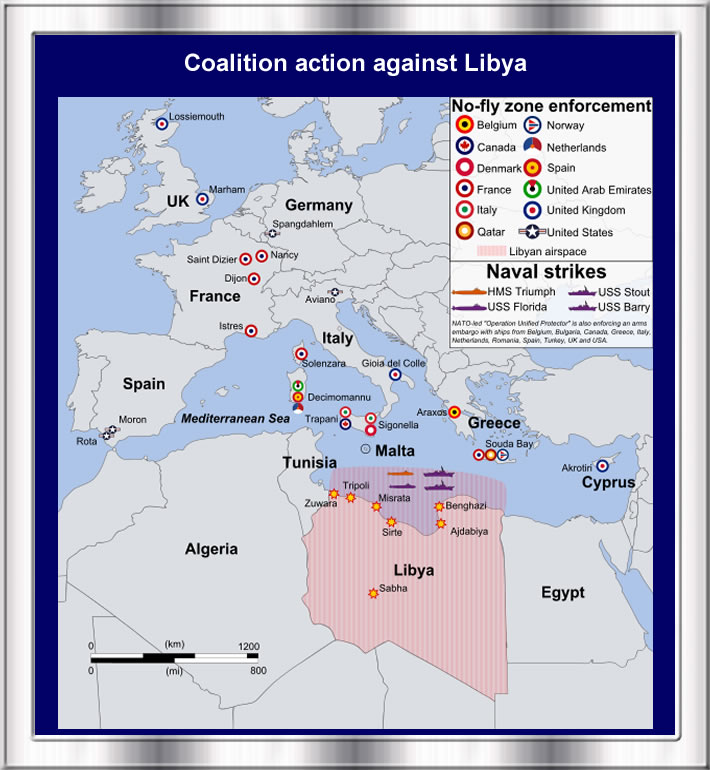
The international community has been trying to prevent the Libyan leader from obtaining revenue from sales, as his regime's violent crackdown on protests
continue.
see more detail via youtube Al Jazeera's Rory Challands reports.
US Supports No-Fly Zone Against Libya. The U.S. decision to support a United
Nations sponsored no-fly zone and possibly other military actions in Libya comes
as forces loyal to Libyan leader Moammar Gadhafi threaten to defeat rebel
opponents. See more detail via Youtube.
Tunisia and Egypt, the first to witness major uprisings, differ from other Northern African and Persian Gulf countries such as Algeria and Libya, by their lack of significant oil revenue which allowed the former to quickly make certain concessions to calm the masses.
The 2010–2011 Middle East and North Africa protests are a revolutionary wave of demonstrations and protests which have been taking place in the Middle East and North Africa since 18 December 2010.
To date, there have been revolutions in Egypt and Tunisia; an uprising in Libya; major protests in Algeria, Bahrain, Djibouti, Iraq, Iran, Jordan, Syria, Oman and Yemen; and minor protests in Kuwait, Lebanon, Mauritania, Morocco, Saudi Arabia, Sudan and Western Sahara.
The protests have shared techniques of civil resistance in sustained campaigns involving strikes, demonstrations, marches and rallies, as well as the use of social media such as Facebook and Twitter to organize, communicate, and raise awareness in the face of attempts at state repression and Internet censorship
.
The most death occured in Libya among the Middle East and North Africa protests since 2010 to 2011 which death toll raised 2000 to 10,000 which overall total death caused 3,500 to 11,000 died among the Middle East and North Africa Tunisia, Algenia, Lebanon, Libya, Jordan, Mauritania, Sudan, Oman, Yemen, Saudi Arabia, Egypt, Syria, Djibouti, Morocco, Iraq, Bahrain, Iran, Kwait, and Western Shara.
The media shows that the Message to Mr. Muammar Gaddafi
is very clear around the world that he is no longer leader of Libya Now Dr. Mustafa Abdul Jali assumed office and He is currently became the leader as a Chairman of the National Transitional Council of Libya since March 5, 2011.
It was based on agreement of municipal councils across various liberated areas, the Council selected Mr. Mustafa Abdul Jaleel as the President of the National Transitional Temporary Council and Mr. Abdul Hafid Abdul Qader Ghoga as his Deputy and the Official Spokesperson for the Council.
Abdel-Jalil, Abdeljalil or Abud Al Jeleil) (born 1952) is a Libyan politician. He was the Minister of Justice (unofficially, the Secretary of the General People's Committee) under Colonel Muammar al-Gaddafi. He has been noted in news media for his stance against various human rights violations in that country. During the 2011 Libyan civil war, Abdul Jalil has been identified as the Chairman of the National Transitional Council based in Benghazi, which controls much of the country in opposition to Gaddafi in Tripoli, although this position is contested by others in the uprising due to his past connections to Gaddafi's regime.
On 5 March 2011, a crisis committee was set up to act as the executive arm of the council.
A transitional government was announced on 23 March 2011.
|
The executive body consists of:
|
|
Mahmoud Jebril – Interim Prime Minister
Omar El-Hariri – Minister of Military Affairs
Ali al-Essawi – Minister of Foreign Affairs
Ali Tarhouni – Minister of Finance
Other ministers are yet to be announced
|
The flag of history is as the follow for Libya:
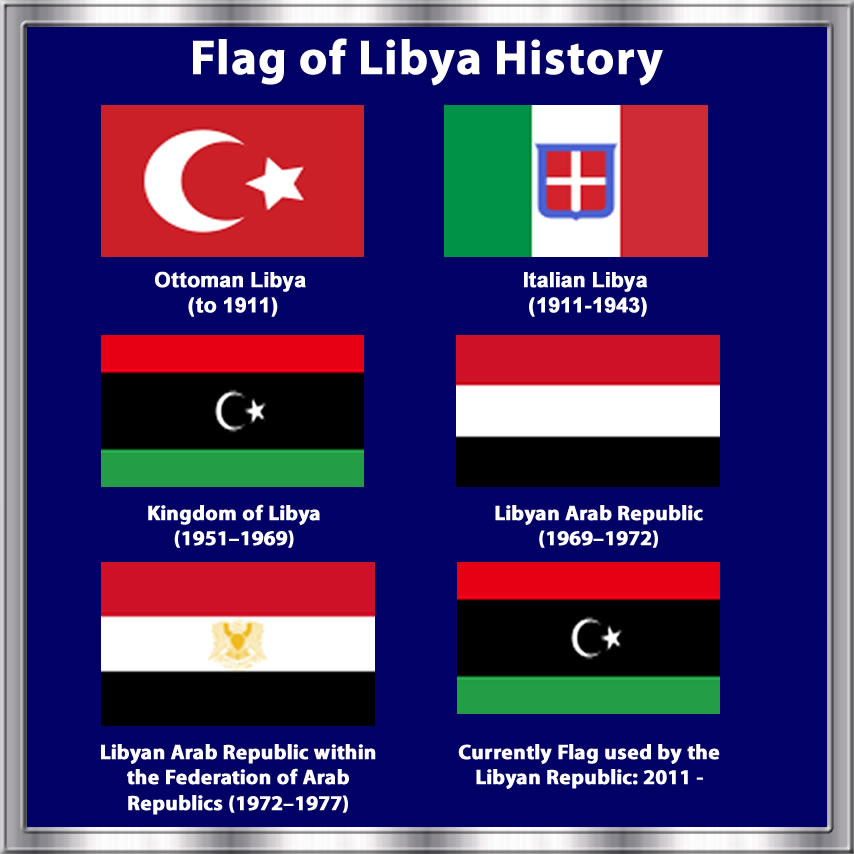
You can see the Regional Flags, See below:
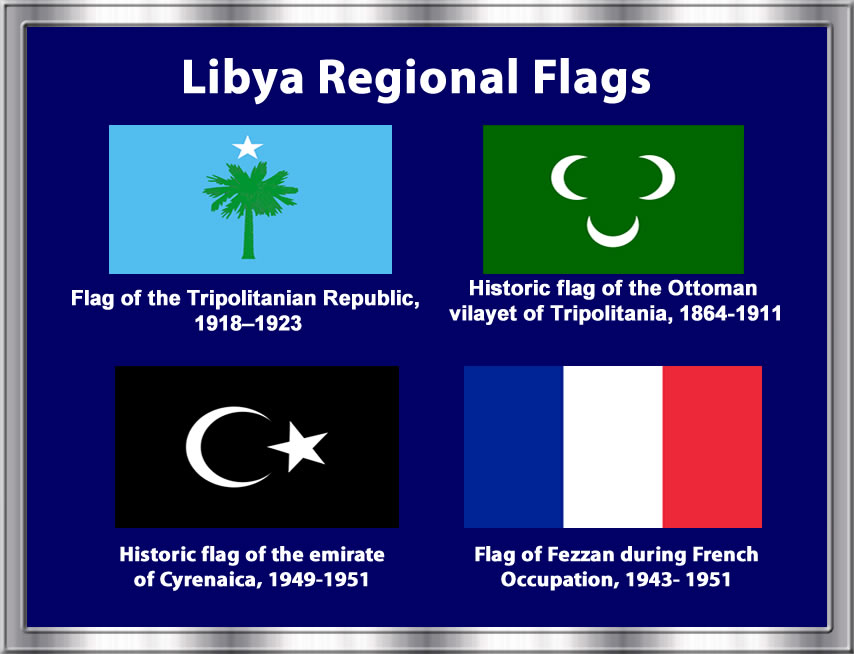
Because of the 2011 Libyan uprising, there are currently two entities claiming to be the government of Libya,
one is an independent state in North Africa. They are the Great Socialist People's Libyan Arab Jamahiriya led by Muammar al-Gaddafi another one is the Libyan Republic led by a National Transitional Council.
You can see their differences via Coat of arms of Libya
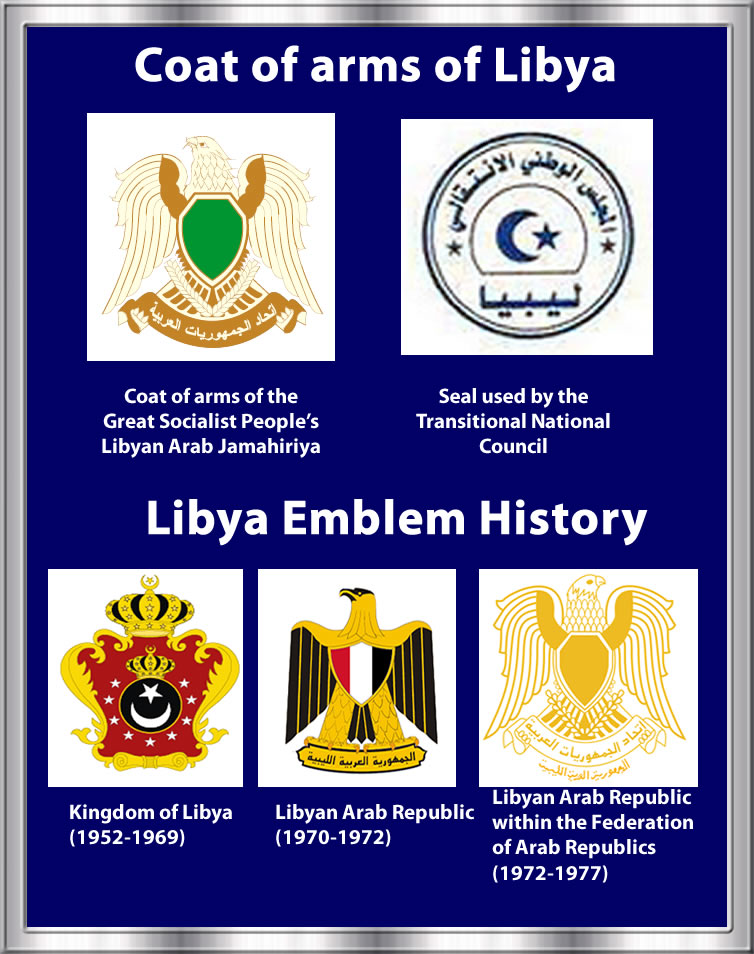
The United States has deployed to support for Libya's people of freedom and their prosperity to continue in secure manner: a naval force of 11 ships, including the amphibious assault ship USS Kearsarge, the amphibious transport dock USS Ponce, the guided-missile destroyers USS Barry and USS Stout, the nuclear attack submarines USS Providence and USS Scranton, the cruise missile submarine USS Florida and the amphibious command ship USS Mount Whitney. Additionally, B-2 stealth bombers, AV-8B Harrier II ground-attack aircraft, EA-18 and F-15 and F-16 fighters have been involved in action over Libya.U-2 reconnaissance aircraft are stationed on Cyprus. On 18 March, two AC-130Us arrived at RAF Mildenhall as well as additional tanker aircraft. On 24 March 2 E-8Cs operated from Naval Station Rota Spain, which indicates an increase of ground attacks. The Following map shows where the location that Pro-Gaddafi forces controlled and where the place controled by anti-Gaddafi forces: Source: wikipedia
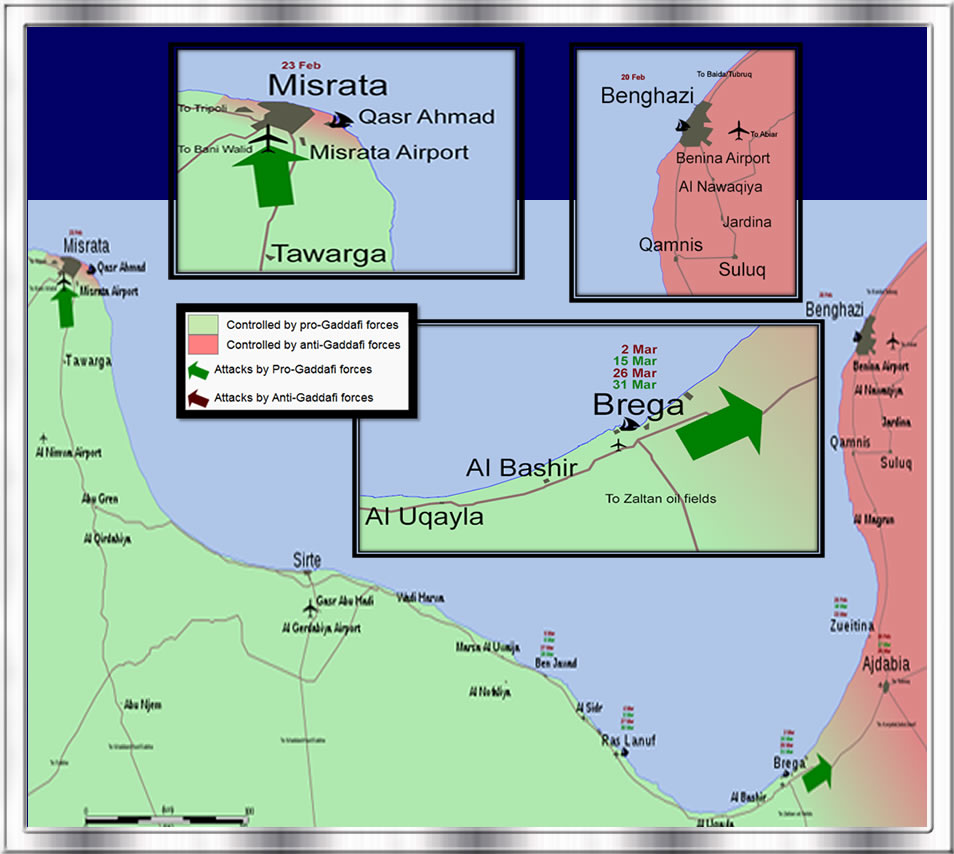
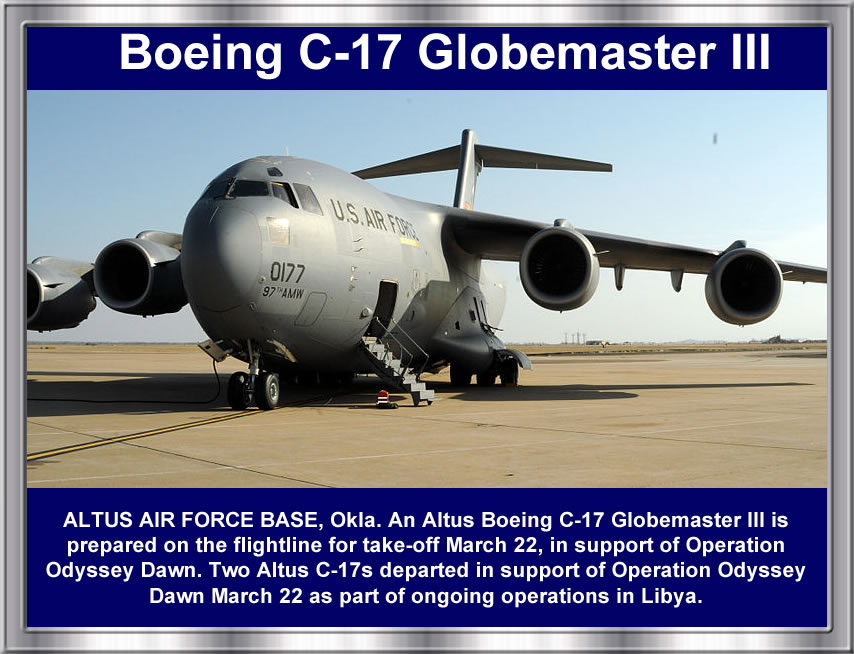

The status as of March 30, 2011 A joint strike force of Air
Force Rafales and Mirage 2000Ds and Navy Rafales and Super Etendards attacked
anti-aircraft missile sites 20 kilometres (12 mi) south of Sirte. A patrol of
two French and four Qatari Mirage 2000-5s conducted air interdiction sorties.
On March 29th, 2011, the
US has used AC-130 gunships and A-10 Thunderbolt tankbusters against Moamar
Gaddafi's troops in Libya. U.S. aircraft have fired on a Libyan coast guard
vessel, forcing it to limp to shore, after it launched missiles at merchant
ships in the port of Misrata, U.S military officials said Tuesday. Two patrols
of Air Force Rafales and Mirage 2000Ds and a patrol of Navy Rafales and Super
Etendards attacked anti-aircraft missile sites 100 kilometres (62 mi) south
west of Tripoli. Two joint patrols of French and Qatari Mirage 2000-5s
conducted air interdiction sorties.[191] Mirage 2000Ds and Super Etendards
bombed a military depot 30 kilometres (19 mi) south of Tripoli. Tuesday saw
two CF-18s fly on a mission to help the rebels by attacking targets in Misrata.
While the United state has supported and sacrificed 16 soldiers killed and 70 vehicles destroyed near Benghazi: 14 tanks, 20 APCs, 2 mobile MRLs, 1 mobile SAM and 33 Jeeps, SUVs, technicals or trucks; 4 out-of-service mobile MRLs destroyed in Tripoli, 20 surface-to-air missile sites bombed; 6 Libyan Soko G-2 Galeb aircraft and 2 Mi-35 military helicopters destroyed near Misrata, 22 tanks, armoured vehicles, and artillery pieces hit by RAF. The Libyan health ministry claims 'almost 100 civilians killed and 445 wounded. The U.S. military claims it has no knowledge of civilian casualties.
President Obama appreciated to the Americans who are serving through these trying times, and the coalition that is carrying our effort forward. Also He addressed that look to the future with confidence and hope not only for our own country, but for all those yearning for freedom around the world.
President Obama tributes to our men and women in uniform for those of who are contributed courage, professionalism and patriotism which they have been forged and countless lives have been saved also appreciated to the troops for supporting our ally Japan, leaving
Iraq to its people, stopping the Taliban’s momentum in Afghanistan, and going
after al Qaeda all across the globe. As Commander-in-Chief, He is also grateful to the
soldiers, sailors, airmen, Marines, Coast Guardsmen, and to their families.
.Sources:
White House
wikipedia
Yahoo News
Youtube
Al Zeejera
 |
catch4all.com,
Sandra Englund, March 30th, 2011 |
|